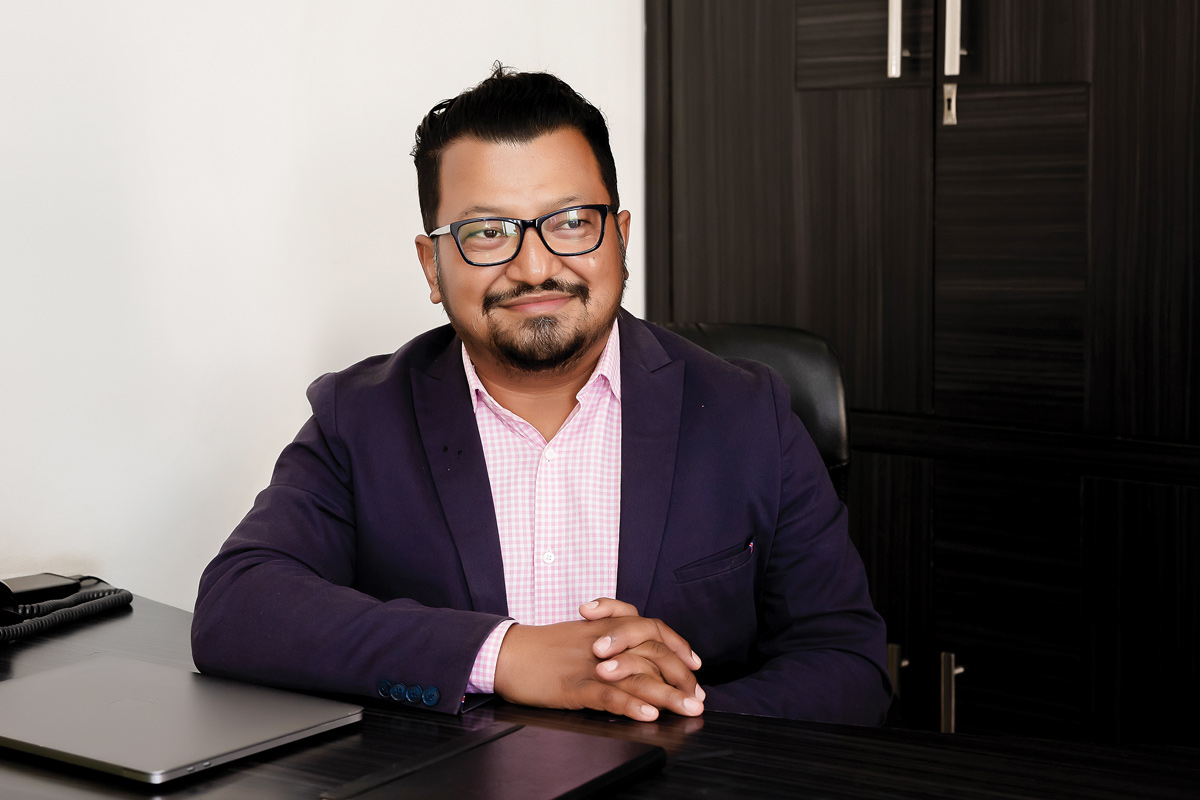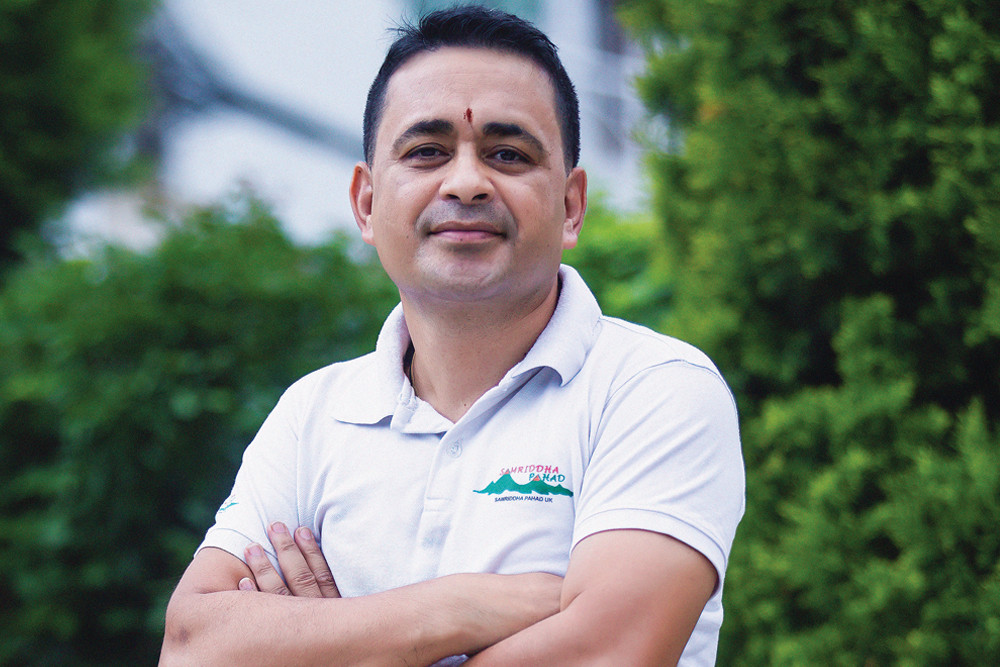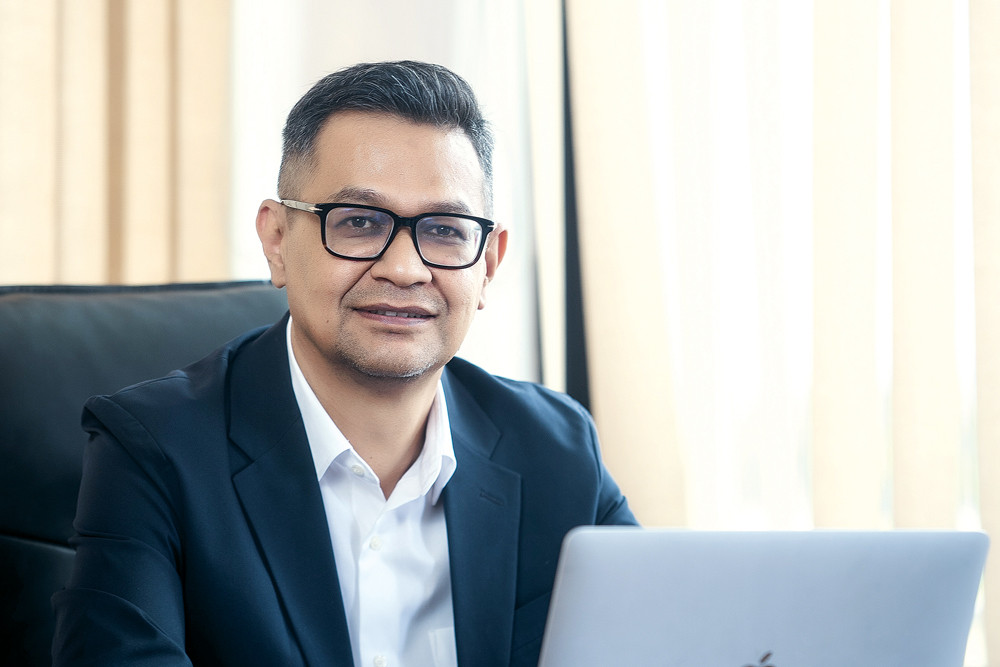
Founder and Managing Director of Outreach Nepal, Ujaya Shakya has over two decades of experience in the field of strategic 360-degree communication, branding and social communication development. He has developed and implemented successful advertising campaigns, media and PR strategies and BCC programs in public health and social issues.
Shakya spearheads one of the most awarded communication groups based in Kathmandu which reinvented brand marketing in Nepal by introducing dedicated verticals specialised in media planning and buying, contemporary creative solutions, experiential marketing and activation, rural communication and visual merchandising, digital and social media optimisation, PR and event management.
Experience in leading marketing communications and brand management for diverse industries, which includes some of the largest FMCG brands, financial and insurance products, consumer durables, automobiles and development sector projects, he has assisted several global brands to successfully launch in Nepal.
Shakya is also the winner of the prestigious Flame Leadership Award 2018 from Rural Marketing Association of India (RMAI) and has also been appointed as the ECI Ambassador for the region representing Nepal, India, Sri Lanka and Bangladesh this year. His first book, ‘Brandsutra’ on branding and advertising was published in the year 2015 and Shakya is regularly invited as jury member and speaker for advertising and brand awards across the region. He is also a regular columnist for global publications on topics related to advertising landscape in Nepal.
Excerpts of an interview with Dibesh Dangol of B360 on what leadership means to Ujaya Shakya.

What is your definition of leadership? What are the characteristics of a good leader?
Leadership is the art of motivating people to act for achieving a common goal. I run an idea-driven business that involves teamwork and so it means directing my diverse team with a strategy to provide marketing communication solutions for my client’s business. A great leader identifies and strikes the right balance. The feeling of collaboration is essential, empowering the people is also a must, and so every team member trusts the leader. As they say, “A leader is one who knows the way, goes the way, and shows the way”.Is leadership inborn or acquired?
It can be both. Traditionally, leadership was considered as an inborn quality that can be fostered and guided. Born leaders are usually charismatic. But in today’s world, others have acquired their leadership based on situation and championed the ability to lead.Do you think gender has anything to do with leadership?
It’s established that there are no significant gender differences. But it is also proven that women have adopted participative styles of leadership and were more transformational leaders than men. I am quite inspired by Indra Nooyi who was among the most powerful women for many years and had a privilege to listen to her in one of the global forums. Noori’s strategic redirection in PepsiCo has had a long-term vision, leaving a positive impact on both society and the environment.What difference do you see between the current generation of entrepreneurs and those of the previous generation?
The previous generation were more risk-takers, they worked with instincts and were more spontaneous, and they truly valued relationship, whereas the new generation business leaders in Nepal are more calculative, planned players and tech-savvy.What are the greatest strengths and weaknesses of a leader?
Strong leadership moves their business forward by empowering the people and generally has a clear vision. Weak leadership can undermine goals. But, every leader has areas of strength and weakness. Creating a clear vision with proper planning, building strong relationships, efficiently executing the work are criteria for moving a business forward.
What is your definition of success?
Success is a relative term and it keeps on changing at different stages in life. Happiness is the key. If you achieve what you want to and are happy, then I think that is a success. The current situation has also reinforced the thought that living a healthy life is also very imperative. But for me the key measurement of business success is in achieving my client’s business objectives, making my team happy and reaching the goal together for the company.Can you tell us about a time you failed and what was your greatest learning from it?
There are numerous and it is very difficult to pinpoint one, but I never saw them as failures. Even though I felt discouraged and disappointed then, my family has always been very supportive and encouraging. Each such occasion gave me good learning. They always planted something in me which came back as valuable experience and gave me invaluable returns later.The pandemic has challenged leadership at every level, what did it teach you?
During this pandemic, the role of the leader’s resilience is essential for the entire organisation and necessitates of being emotional and psychological strength to the team. I was ‘positively paranoid’ in the sense to see what can happen in future. But at the same time, we need to lead with positivity. We had to be extremely flexible in terms of changing plans with the changed scenario both with the team and the clients who worked with us. And of course, be ready with Plan A, B, C and D. We had to preserve our resources from the long-term perspective. Also, it was very important to stay away from negative news by looking for positive aspects. I think it taught me to be calmer and more resilient. I also practice some meditation during the lockdown period.What are some of the things that you would never settle for or tolerate in your work?
I cannot tolerate dishonesty and disrespect. Our culture has taught us to be respectful of elders. I will not tolerate or settle for lack of these qualities. Negativity can kill motivation and enthusiasm so we should try and avoid both negative people and thoughts.What are the three leadership lessons you think are essential for companies to succeed?
The most important lessons are to have the right vision and communication. A positive mental attitude with the power of enthusiasm and the ability to delegate work to the right people is a must.A leader you are inspired by...
Many inspire me as I am quite an emotional person who loves reading autobiographies of business people in particular and they have all inspired me in different ways. At times while reading their stories, I wished I could live their life even though there were many challenges, which as a key protagonist and true hero, they could overcome in the process. Some of the most inspirational leaders I have read and got inspired by are Akio Morita, Lee Iacocca, Jack Ma, Steve Jobs, Elon Musk, Jeff Bezos, Larry Page, Warren Buffet, Indra Nooyi, Ratan Tata, Mukesh Ambani, Paul Polman, R. Gopalakrishnan and when it comes to my industry I love Martin Sorrell and Sam Balsara and of course Binod Chaudhary in Nepal.Books on leadership you would recommend...
Winning by Jack Welch, The case of the Bonsai Manager by Gopalakrishnan, The Tipping Point by Malcolm Gladwell and Good to Great by Jim Collins. In recent times, I love both the books by my friend Chandramouli – Catalyst and Get Better at Getting Better. I feel, they are very practical in the current context and I could relate to them very well. Currently, I am re-reading the autobiography of Akio Morita, Made in Japan. The book was given to me by a close friend about 20 years back at the beginning of my professional career and now I am re-reading it. It’s inspiring me again and there are many situations which I could relate to. I would once again like to thank my friend who gave me the book two decades back and I was able to keep it with me. Most probably, I will ask my son to read it.What do you do to continually grow as a person, and as a leader?
Continuous learning is a must particularly in my industry as it is changing radically. I need to update myself with new knowledge relevant to the current ecosystem. Also to be open-minded so that I can see the changes and accept them.
Published Date: January 14, 2021, 12:00 am
Post Comment
E-Magazine
RELATED Leadership


.jpg)


.jpg)